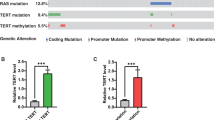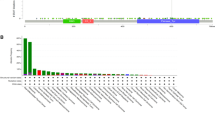Abstract
Promoter hypermethylation of multiple genes have been identified to play a role in thyroid cancers and most prominent among them is TSHR gene promoter hypermethylation in particular showing a close association with BRAF gene-altered status. Thus, the aim of this study was to analyze the TSHR gene promoter hypermethylation in a series of thyroid tumor tissues in the backdrop of their BRAF gene mutational status. Methylation-specific PCR (MS-PCR) was used for detection of promoter methylation while BRAF gene mutational status was analyzed by PCR followed by DNA sequencing in the same series of 60 thyroid tumor tissues. The promoter region of TSHR gene was found to be methylated in 25 % (15 of 60) of the thyroid cancer patients. Patients having elevated TSH levels showed strong association with methylation (OR = 4.0, P = 0.02). BRAF V600E mutation was found in 25 % (15 of 60) patients and among them TSHR promoter was methylated in 73.3 % (11 of 15) patients and only 26.7 % (4 of 15) patients with mutated BRAF showed the absence of TSHR promoter methylation. We found a significant association between the presence of methylation in TSHR with the BRAF V600E mutation-positive cases (P < 0.05). In conclusion, our study showed a high implication of TSHR gene methylation and its significant association with BRAF V600E mutation in thyroid tumors, depicting a positive connection between TSHR pathway and MAP Kinase pathway.


Similar content being viewed by others
References
M. Xing, Gene methylation in thyroid tumorigenesis. Endocrinology 148(3), 948–953 (2007)
H. Zuo et al., Downregulation of Rap1GAP through epigenetic silencing and loss of heterozygosity promotes invasion and progression of thyroid tumors. Cancer Res. 70(4), 1389–1397 (2010)
D. Russo, G. Damante, E. Puxeddu et al., Epigenetics of thyroid cancer and novel therapeutic targets. J. Mol. Endocrinol. 46(3), R73–R81 (2011)
F. Alvarez-Nuñez, E. Bussaglia et al., Thyroid Neoplasia Study Group PTEN promoter methylation in sporadic thyroid carcinomas. Thyroid 16(1), 17–23 (2006)
M. Xing, H. Usadel, Y. Cohen et al., Methylation of the thyroid-stimulating hormone receptor gene in epithelial thyroid tumors: a marker of malignancy and a cause of gene silencing. Cancer Res. 63(9), 2316–2321 (2003)
U. Schagdarsurengin, O. Gimm, H. Dralle, C. Hoang-Vu, R. Dammann, CpG island methylation of tumor-related promoters occurs preferentially in undifferentiated carcinoma. Thyroid 16(7), 633–642 (2006)
A.P. Bird, CpG rich islands and the function of DNA methylation. Nature (Lond) 321(6067), 209–213 (1986)
P.W. Ladenson, M.E. Ewertz, R.A. Dickey, Practical application of recombinant thyrotropin testing in clinical practice. Endocr. Pract. 7(3), 195–201 (2001)
J.A. Smith, C.Y. Fan, C. Zou, D. Bodenner et al., Methylation status of genes in papillary thyroid carcinoma. Arch. Otolaryngol. 133(10), 1006–1011 (2007)
M.O. Hoque, E. Rosenbaum, W.H. Westra et al., Quantitative assessment of promoter methylation profiles in thyroid neoplasms. J. Clin. Endocrinol. Metab. 90(7), 4011–4018 (2005)
J. Kim, A.E. Giuliano, R.R. Turner et al., Lymphatic mapping establishes the role of BRAF gene mutation in papillary thyroid carcinoma. Ann. Surg. 244(5), 799–810 (2006)
D.A. Kleiman, D. Buitrago, M.J. Crowley et al., Thyroid stimulating hormone increases iodine uptake by thyroid cancer cells during BRAF silencing. J. Surg. Res. 182(1), 85–93 (2013)
C. Durante, E. Puxeddu, E. Ferretti et al., BRAF mutations in papillary thyroid carcinomas inhibit genes involved in iodine metabolism. J. Clin. Endocrinol. Metab. 92(7), 2840–2847 (2007)
G.C. Maria, F. Nicoletta, B. Giuseppe, Epigenetic modifications and therapeutic prospects in human thyroid cancer. Front. Endocrinol. 3(40), 1–8 (2012)
W.A. Palmisano, K.K. Divine, G. Saccomanno et al., Predicting lung cancer by detecting aberrant promoter methylation in sputum. Cancer Res. 60(21), 5954–5958 (2000)
E. Puxeddu, S. Filetti, BRAF mutation assessment in papillary thyroid cancer: are we ready to use it in clinical practice? Endocrine 45(1), 341–343 (2014)
H. Shao, X. Yu, C. Wang, Q. Wang, H. Guan, Midkine expression is associated with clinicopathological features and BRAF mutation in papillary thyroid cancer. Endocrine (2013). doi:10.1007/s12020-013-0068-y
L. Dingxie, H. Shuiying et al., Suppression of BRAF/MEK/MAP kinase pathway restores expression of iodide-metabolizing genes in thyroid cells expressing the V600E BRAF mutant. Clin. Cancer Res. 13(4), 1341–1349 (2007)
G. Riesco-Eizaguirre, I. Rodriguez, A. DelaVieja et al., The BRAF V600E oncogene induces transforming growth factor beta secretion leading to sodium iodide symporter repression and increased malignancy in thyroid cancer. Cancer Res. 69(21), 8317–8324 (2009)
C. Romei, R. Ciampi, P. Faviana et al., BRAF V600E mutation, but not RET/PTC rearrangements, is correlated with a lower expression of both thyroperoxidase and sodium iodide symporter genes in papillary thyroid cancer. Endocr. Relat. Cancer 15(1), 511–523 (2008)
N. Mitsutake, J.A. Knauf, S. Mitsutake et al., Conditional BRAF V600E expression induces DNA synthesis, apoptosis, dedifferentiation, and chromosomal instability in thyroid PCCL3 cells. Cancer Res. 65(6), 2465–2473 (2005)
M. Xing, W.H. Westra et al., BRAF mutation predicts a poorer clinical prognosis for papillary thyroid cancer. J. Clin. Endocrinol. Metab. 90(12), 6373–6379 (2005)
D. Chakravarty, E. Santos, M. Ryder et al., Small-molecule MAPK inhibitors restore radioiodine incorporation in mouse thyroid cancers with conditional BRAF activation. J. Clin. Investig. 121(12), 4700–4712 (2011)
C. Nucera, M.A. Nehs, S.S. Nagarkatti et al., Targeting BRAF V600E with PLX4720 displays potent anti-migratory and anti-invasive activity in preclinical models of human thyroid cancer. Oncologist 16(3), 296–305 (2011)
A.K. David, B. Daniel et al., Thyroid stimulating hormone increases iodine uptake by thyroid cancer cells during BRAF silencing. J. Surg. Res. 111(1), E1–E9 (2012)
M. Nilsson, Iodide handling by the thyroid epithelial cell. Exp. Clin. Endocrinol. Diabetes 109(5), 13–17 (2001)
L.S. Scheinbart, M.A. Johnson, L.A. Gross et al., Procainamide inhibits DNA methyltransferase in a human T cell line. J. Rheumatol. 18(4), 530–534 (1991)
Acknowledgments
The authors acknowledge the technical staff of operation theater of the Department of General Surgery. Their thanks are also due to the faculty members and research scholars of the Department of Clinical Biochemistry, SKIMS, Srinagar, Kashmir. This study was funded by Sher-I-Kashmir Institute of Medical Sciences, Soura, Srinagar, Kashmir, India-190011.
Conflict of interest
The authors declare that there is no conflict of interest that could be perceived as prejudicing the impartiality of the research reported.
Author information
Authors and Affiliations
Corresponding author
Rights and permissions
About this article
Cite this article
Khan, M.S., Pandith, A.A., Masoodi, S.R. et al. Epigenetic silencing of TSHR gene in thyroid cancer patients in relation to their BRAF V600E mutation status. Endocrine 47, 449–455 (2014). https://doi.org/10.1007/s12020-014-0319-6
Received:
Accepted:
Published:
Issue Date:
DOI: https://doi.org/10.1007/s12020-014-0319-6




